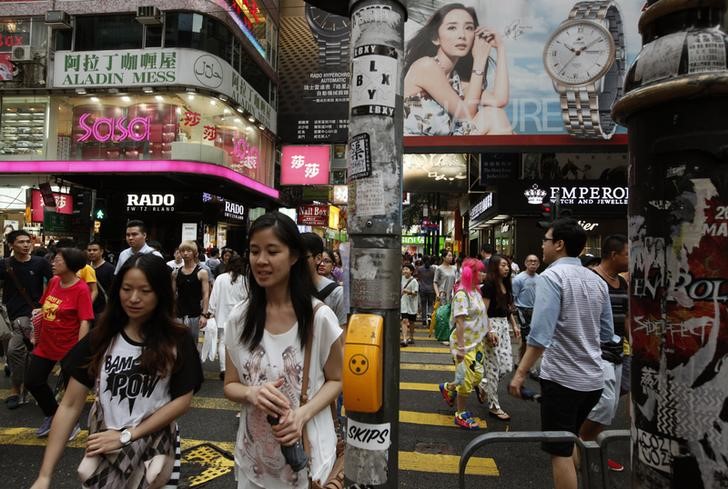By Clare Baldwin and James Pomfret
HONG KONG (Reuters) - The number of mainland Chinese visitors to Hong Kong during the Lunar New Year holidays fell for the first time in about 20 years as they have felt increasingly unwelcome amid political unrest in the city.
The drop comes as Hong Kong's leader Leung Chun-ying said he would raise the issue of large numbers of mainland Chinese visitors with Beijing at a parliamentary meeting next month.
"If we have to restrict or decrease the numbers of mainland Chinese coming to Hong Kong then we must continue to discuss this with (China)...this is a difficult task," he said.
The drop, though a mild 0.3 percent over the first three days of the holiday, is the first decrease in Lunar New Year arrivals from China in about two decades, according to a major travel industry group, and could presage longer term decreases that could impact the city's economy.
"It's alarming," said Joseph Tung, the Executive Director of Hong Kong's Travel Industry Council.
Over 40 million mainland tourists streamed into Hong Kong last year, spending freely in luxury shops, malls, restaurants and hotels, as well as emptying local stores of daily necessities such as baby milk formula and cosmetics.
Tung and other travel industry heavyweights say political tensions in Hong Kong including pro-democracy demonstrations last year and a recent spate of anti-China shopper protests in local malls have discouraged tourists from mainland China.
"Put yourself in their shoes. If you feel as though people are not welcoming you, why would you come to Hong Kong?" Tung said. "If these things carry on... the high spenders in China can just go elsewhere, like Europe."
China is the biggest source of outbound tourists globally, and mainland tourists are expected to double to 200 million by 2020, according to a report last month by CLSA.
A total of just 437,199 of those tourists arrived in Hong Kong early in the new year, the Immigration Department said.
Hong Kong was returned to China in 1997 under a formula that granted it a separate legal system, far greater freedoms than in mainland China and an eventual goal of universal suffrage.
Democracy activists occupied major roads for two-and-a-half months last year to demand open nominations in the next chief executive election in 2017. Beijing refused to negotiate, saying it would allow only between pre-screened candidates.
Nearly three months after police cleared the last of the protesters, lingering frustration has stoked a new front of radical activism and turned shopping malls and university campuses into fresh battlegrounds targeting mainlanders.
A shortage of hotel rooms and tourist attractions as well as shifting exchange rates are also hurting Hong Kong, according to CLSA, which predicts Hong Kong's share of mainland tourists will drop to 26 percent in 2020 from 41 percent in 2013.

The trend in China's other special administrative region, Macau, is the opposite. Visits to the gambling hub by mainland Chinese grew 6.9 percent to 434,549 in the first three days of the Lunar New Year, according to the city's tourist board.